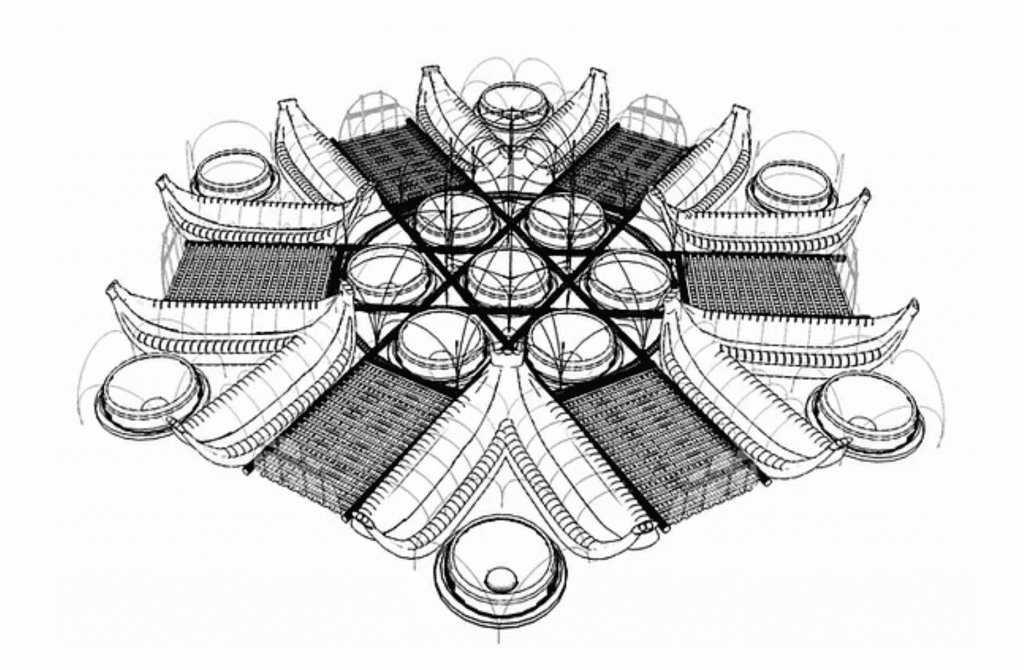
Although the liturgical season of Lent began two weeks ago, many of us were unable to come together with our church communities to receive ashes on our foreheads. And yet, many of us may feel as though we’ve had ashes on our foreheads for many months already. Some of us have taken to calling this long Lent-ish pandemic season “Coronatide.” In truth, the tides of the plague and its ensuing isolation engulf many of the embodied traditions that anchor our church communities, that help us feel, together, like the Body of Christ. While whatever bonds we had with our church and other communities feel strained, there has also been an odd, all-too-rare undercurrent of solidarity for people near and far, as though it took a pandemic for many of us (me included) to feel as though we are really all out on the same sea together. For some, this feeling of solidarity has welled up to the surface with declarations about unity and community, about how “we’re all in the same boat!”
This sentiment is both deeply true and truly false. It is deeply true in that we all face spiritual, emotional, or physical isolation in this season. It is also truly false in that we are all materially on different boats, and this has implications for how we journey as communities in Christ.
In the material sense, some of us feel like we have a whole crew on our ship with us, several lifeboats and life jackets handy, food for a months-long voyage, and the tools to navigate toward the edge of the storm.
Others of us feel all alone, hanging on a piece of driftwood that is being relentlessly swept toward the center of the tempest, with our friends around us just trying to cling to their own bit of flotsam.
And many of us are somewhere in between.
Yes, distressingly, pre-Covid-19 socioeconomic inequality has only worsened during the pandemic, disproportionately affecting people in poverty. This is especially true for poor people of color. Because of centuries of injustice perpetrated by professing Christians, who enslaved and packed Africans below deck on boats headed to the American colonies, wealthy “white” folks have been passing down well-appointed boats to their offspring for generations, while many people of color have not had the privilege of being able to do that. It would seem “we are not all in the same boat. We are all in the same storm. Some are on super-yachts. Some have just the one oar.”
If we are not in the same boat, then what does it look like to be disciples of Christ on the same turbulent sea? What does it look like to be in community with one another?
For one, those of us with material resources (or time) can contribute to a variety of organizations that are helping those most struggling, advocate for policy reform, offer up our “lifeboats” to neighbors, or, given the opportunity, even take the rash-seeming step of inviting someone onto our boat. We can also open ourselves up to let God address the resistance that comes up in our hearts when we are prompted to support those whom we may not truly see as “ours,” as part of our community.
Of course, even if we have many material resources to keep us afloat, we often find ourselves spiritually floundering (e.g., Matt. 19:16-30), and the person just clinging to driftwood may in fact be spiritually rich (e.g., James 2:5). Despite having fewer material resources, historically black and brown communities, rooted in their churches, have stewarded a powerful legacy of spiritual vitality that has allowed many people to survive the material poverty and the psychological trauma caused by race-based oppression. Those of us who have not suffered these realities would do well to seek out and learn from our siblings of color, especially now.
For while we have all always been on the same sea, in different boats, the pandemic has put us “in the same boat” in one important way: we are all experiencing a disorienting spiritual, physical, and emotional isolation. We are all having to ask, “What does community look like now?”
Even if we sometimes win the lottery to attend church in person, it is not the same with masks and distance from other members of the Body of Christ. Even we live with our beloved significant other and/or our children, being stuck in the same home together day after day can feel, as our friends with four still-not-at-school kids say, “the best of times and the worst of times.” Many of us have lost loved ones, have struggled to help friends grieve without physically being with them, feared for our own lives, or wondered where God is in all of this. Even if we live with others, there is a sort of looming loneliness to this storm, a disquietedness that makes it hard to even be present to ourselves.
This is the sort of loneliness that Henri Nouwen suggests makes us long for—wait for it—solitude. You may be wondering, “Aren’t these words vaguely synonyms… about being alone?” “Far from it,” Nouwen says, gently. In fact, neither of these words ultimately refers to the proximity of other warm bodies to ours. In his Reaching Out, Nouwen describes loneliness as resulting from not making the time to slow down and listen to the needs of our hearts, primary among them the need to experience God’s unconditional love. Without being rooted and grounded in this love, we are perpetually insecure, suspicious of whether others truly love us, and unable to love others truly—that is, in a way that isn’t ultimately about meeting our unmet needs. This puts deep friendship and community all but out of reach.
It is ultimately this dynamic within us – not plagues and enforced isolation – that makes us truly lonely.
This exhausting loneliness is, paradoxically, what makes us long for solitude. In solitude, we have inner time and inner rest to wait and listen. We are content, as Rilke puts it, to “live the questions,” to move slowly enough to listen to what is “unsolved in our hearts” instead of frenetically jumping toward answers. In being deeply present to ourselves, in a moment-to-moment way, we are freed up to be truly present to others. Rather than being greedy for attention or affection, we can offer ourselves in love, such that we create a free space of hospitality for others to also convert their own loneliness into a restful solitude—a solitude which we can then share together and with God. For rather than separating us from others, solitude of heart creates space for us to hold the pain and struggles of others in a solidarity that has the power to change our own hearts and minds. Rather than absorb us in the constant worry and anxiety that a broken world would suggest is only rational, this solidarity drives us, more and more constantly, to prayer and to creative action—toward God.
I wonder whether in this Lenten season, during the isolation of Coronatide, we might ask God to use the pangs of loneliness we feel and the cries of others for support to grow in us a deep solitude of heart. If you have been given the luxury of slowing down in this season, use it to listen. Perhaps even as our ties to our communities feel weakened, this Lent can be a time of preparation—not for going back to community life as it was before, but for a Spirited reimagining of what it means to be community.
 In this season of reflection and repentance, might God show us who our communities are missing, who we see in our heart of hearts as not really eligible for membership, for belonging, with us—who we don’t want to care about? Perhaps God will give us a vision for how we might lash together even our little coracles and fishing boats into an ark that is truly a hospitable place for the beloved community to grow. May it be so.
In this season of reflection and repentance, might God show us who our communities are missing, who we see in our heart of hearts as not really eligible for membership, for belonging, with us—who we don’t want to care about? Perhaps God will give us a vision for how we might lash together even our little coracles and fishing boats into an ark that is truly a hospitable place for the beloved community to grow. May it be so.
This very endeavor is what we seek to embody every month during our Coracle Community Gatherings. We have developed a unique rhythm– of solitude, of personal reflection, of edification, of shared celebration (and sometimes mourning), and of moving together into the brokenness of the world– which has been a refreshing and stabilizing presence in the lives of our little community of lashed-together rafts this past year. We would love to have you join us at our next Gathering, on the 2nd Wednesday of the month, from 7-9pm. You can learn the basic flow of our evenings together HERE, and if you’d like the Zoom link, please just email me!
Image Credits:
- © Barbara Kelley from the Wall Street Journal
- © 2017 by Safina Projects CIC
